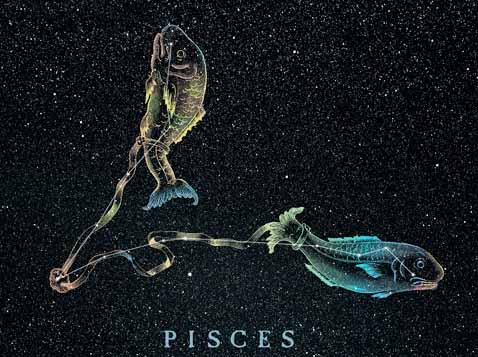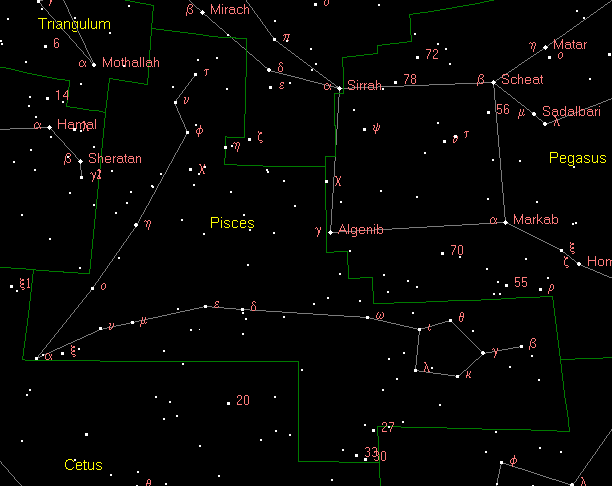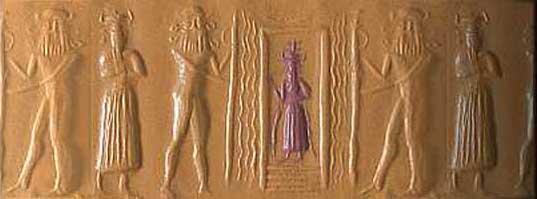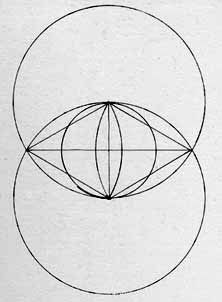
February 20 - March 20
Pisces is a Water Sign
Pisces is a Mutable Sign

Pisces is ruled by Neptune

February 20 - March 20
Pisces is a Water Sign
Pisces is a Mutable Sign

Pisces is ruled by Neptune

Pisces is the twelfth astrological sign in the Zodiac, which started from the Pisces constellation. It spans the 330-360th degree of the zodiac, between 332.75 and 360 degree of celestial longitude, which in the Tropical zodiac the Sun transits this area on average between February 19 to March 20 each year.
It is also considered a water sign and one of the four mutable signs. Being the twelfth sign, Pisces is associated with the astrological twelfth house.
In Sidereal astrology, the sun currently transits the constellation of Pisces from March 15 to April 14 (approximately). Individuals born during these dates, depending on which system of astrology they subscribe to, may be called "Pisceans".
Pisces is a water sign, meaning that it is highly compatible with two other Water signs, Cancer and Scorpio. Pisces is also compatible with the Earth signs, Taurus, Virgo and Capricorn.
Pisces governs the feet, liver and lymphatic, and its subjects can be threatened by anemia, boils, ulcers and other skin diseases, especially inflammation of the eyelids, gout, inflammation, heavy periods and foot disorders and lameness.
Positive Aspects:
Imaginative and sensitive
Compassionate and kind
Selfless and unworldly
Intuitive and sympathetic
Negative Aspects:
Escapist and idealistic
Secretive and vague
Weak-willed and easily led
Pisces is one of the less flamboyant signs and its natives are more ordinary than those of, for example, Leo, Scorpio and Aquarius. Pisceans possess a gentle, patient, malleable nature. They have many generous qualities and are friendly, good natured, kind and compassionate, sensitive to the feelings of those around them, and respond with the utmost sympathy and tact to any suffering they encounter.
They are deservedly popular with all kinds of people, partly because their easygoing, affectionate, submissive natures offer no threat or challenge to stronger and more exuberant characters. They accept the people around them and the circumstances in which they find themselves rather than trying to adapt them to suit themselves, and they patiently wait for problems to sort themselves out rather than take the initiative in solving them. They are more readily concerned with the problems of others than with their own.
Their natures tend to be too otherworldly for the practical purposes of living in this world as it is. They exist emotionally rather than rationally, instinctively more than intellectually. Their willpower, ambition they long to be recognized as greatly creative and reasoning are all limited and, however anxious they are to fulfill themselves, their concentration is weak; they lack decisiveness and they are easily diverted from their purposes.
They are apt to live a shiftless sort of life, searching for some career in which they can really find themselves, but being easily discouraged they become despondent, feeling unappreciated and moving on to something or someone else. They also dislike disciple and confinement within routine the nine-to-five life is not for them - and confinement by codes of behavior. Any rebellion they make against convention is personal, however, as they do not have the energy to battle against the Establishment.
Pisceans tend to withdraw into a dream world where their qualities can bring mental satisfaction and sometimes, but by no means inevitably, fame and financial reward for they are gifted artistically. They are also versatile and intuitive, have quick understanding, observe and listen well, and are receptive to new ideas and atmospheres. All these factors can combine to produce remarkable creativity in literature, music and art.
They may count among their gifts mediumistic qualities which can give them a feeling that their best work comes from outside themselves, "Whispered beyond the misted curtains, screening this world from that." Even when they cannot express themselves creatively they have a greater than average instinct for, and love of, beauty in art and nature, a catlike appreciation of luxury and pleasure, and a yearning for new sensations and travel to remote, exotic places.
They are never egotistical in their personal relationships and give more than they ask from their friends. They are sexually delicate, in the extreme almost asexual, and most Pisceans would want a relationship in which the partner's mind and spirit rather than the body resonated with their own. Unfortunately they can be easily misled by a lover who courts them delicately and in marriage makes them unhappy by a coarser sexuality than they expected. They are nevertheless intensely loyal and home-loving and will remain faithful - though their dreamy and impractical natures do not fit them to keep a tidy and well-run house.
In their employment they are better working either by themselves or in subordinate positions. Their talents are individual in a commercial business or similar undertaking they would be afraid to manage more than a small department, worrying always that they would fail in a crisis.
They can make fair secretaries and bookkeepers. Their sympathy equips them for work in charities catering for the needy, as nurses looking after the sick and as veterinary surgeons caring for animals. As librarians or astronomers they can satisfy their mental wanderlust, and their fondness for "faraway places with strange-sounding names" may turn them into sailors or travelers. Many architects and lawyers are Pisceans, and when the creative abilities are combined with gifts of imitation and the ability to enter into the feelings of others, Pisceans find their fulfillment on the stage.
Their psychic and spiritual qualities can lead them into careers in the church or as mediums and mystics. They may find an outlet for their creativity as caterers, and are said to make good detectives because they can imagine themselves in the place of criminals and understand how their minds would work. In technical occupations they are well employed in dealing with anesthetics, fluids, gases and plastics. Because of their lively versatility and inability to concentrate overmuch on any one project, Pisceans often simultaneously follow more than one occupation.
Their faults are exasperating rather than vicious. They can be over subtle, oversensitive and overemotional. In business they can be unreliable, idle, careless, impractical and ineffective. Their friends may find their diffidence and sense of their own unimportance irritating and may eventually want to shake off acquaintances who not only lack initiative but are peevish and extravagantly temperamental in their dependence on them. Other faults of which the negative Piscean is accused are fickleness, gossiping, indiscretion, effeminacy and gullibility. They may not be able to avoid being sickly, but their fretting hypochondria can wear out a saint's patience.
They can be intellectually dishonest and also actually fraudulent, deceitful and hypocritical. They are often indecisive in important matters yet will uphold absurdities with the obstinacy of the weak. When they feel themselves rejected, lonely or failures, or simply through feeble self-indulgence, they will find refuge in drugs or the bottle.

Pisces lies between Aquarius to the west and Aries to the east. The ecliptic and the celestial equator intersect within this constellation and in Virgo.
The constellation resembles two round objects each of which is tied to the same point by a long length of string. Generally the objects have been considered as fish, although since by including fainter stars visible to the naked eye, the strings themselves take on the appearance of stick-figure bodies (with the round objects thus becoming heads), some forms of early Greek mythology viewed it as men bound to a point. It is generally thought that in earlier depictions, only the constellation 'Piscis Austrinus' was considered to be a fish.
According to one version in Greek mythology, this constellation represents fish into which Aphrodite and Eros transformed in order to escape the monstrous Typhoon. The two fishes are often depicted tied together with a cord, to make sure they do not lose one another.
According to another version, since the binding point is below the ecliptic, and thus considered to represent being in the underworld, and that one of the figures (the one on the left) appears to escape, but the other (on the right) seems to head back toward the ecliptic, then, together with Cetus (another constellation in the Zodiac sign of Pisces), this may have formed the basis of the myth of the capture of Cerberus, one of The Twelve Labors of Heracles.
This constellation, the last in the Zodiac, is associated with a Greek legend about Aphrodite, the goddess of beauty, and her son Eros, the god of love. The two were walking along a river one day when the terrible monster Typhoon suddenly rose up out of the water, intent on their destruction. Typhoon was ancient and awful. He is alternately identified as the offspring of Gaia and Tartaros, of Hera and Kronos or of Hera alone. No matter what his parentage, Typhoon was as strong as a Titan, and therefore as strong as the Olympians. He was as tall as the heavens and his eyes shot flames. Instead of fingers, he had 100 dragon's heads sprouting from his hands.
None of the Olympians had the power to destroy Typhoon alone. For a time, all they could do was flee from him. They often did so by transforming themselves into animals. Aphrodite and Eros, in this case, transformed themselves into fish and swam away. Alternately, they dove into the river and were rescued by two friendly fish, who carried them to safety. Two fish were hung in the sky, their tails intertwined, to commemorate the day when Love and Beauty were saved.
The Age of Pisces is considered by some as the Age of Christianity, inasmuch as the 2160 years sometimes allotted also coincides reasonably with that religion's tenure on Earth. But from a broader point of view, all the Ages are more likely tied to specific deities of ancient Sumerian notoriety.

In this respect, Enki, the Sumerian god of wisdom, and the alleged true father of mankind, is associated with the planet Neptune, which astrologically rules the sign of Pisces. Additionally, Enki might have originally landed on the Earth in an earlier Age of Pisces and thus obtained “prior rights” to this portion of Earth's Grand Cycle. In this respect, the Age of Pisces can be thought of as the Age of Enki. The supposition is that, if the Anunnaki, Enki and Enlil, and all the rest are in fact the Gods and Goddesses of the ancient world, and if they rule the Earth with precedence given to the god to whom the Age belongs, then for the last 2000 to 2800 years, Enki has been in charge of Earth.
This would also imply that during the prior Age of Aries (roughly 2400 to 600 B.C.E.), the Age was ruled by Mars, the god of war. Aries is very much a male (macho) sign, and is likely to have been a time when the aggressive male energy dominated affairs. This might best be illustrated by the reign of Marduk in Babylon. Marduk is traditionally associated with Mars, and his reign, primarily from Babylon would have occurred after the fall of the Sumerian civilization circa 2000 B.C.E.. The word Cairo in the ancient language of the time means Mars.
Just prior to the Age of Aries is the Age of Taurus (4600 to 2400 B.C.E.). Taurus is very much a female sign, and implies an Age ruled by the Goddess. This was also the time when Alpha Draconis was being recognized as the pole star. This is noteworthy in that in most goddess cultures, the dragon is considered the defender of the feminine. This is also why Saint George allegedly slaying the dragon is but a metaphor for the patriarchy's ascent over the prior matriarchal cultures - described more fully in Astrology According to the Goddess and the goddess, Inanna's Descent into Hades). However, because the Anunnaki is a male dominated, chauvinistic group, there is little likelihood that the Goddess's authority went unchallenged. It is more likely that the day-to-day, routine bloodshed in war and otherwise was temporarily muted somewhat.
Of perhaps more relevance to those of us living today, however, is the rapid approach of the Age of Aquarius. This age, being astrologically ruled by Uranus, will supposedly come under the province of the god, Anu (the father of Enki and Enlil).
Historically, Anu has demonstrated something of a hands-off management style, leaving a lot of the details to his two sons - who did not get along at all (and is probably the cause of human misery during the last ten thousand years. Because of Anu's history, there appears no way to guess what to expect with respect to the coming Age of Aquarius.
Mythology: Anu is the alleged ruler of Nibiru the home planet of the Anunnaki, and because of the Nibiru Cycle - which keeps Nibiru at an enormous distance from the Earth during the next couple of hundred years - there is little likelihood that Anu will be doing any management of Earth - hands on or hands off. Instead, there will more likely be a continuation of the present, dismal state of affairs, or if Enlil is so inclined, a return to the days of Enki versus Enlil; the personification of free will versus obeying the whims of a god or goddess.
"The Age of Monotheism, Spirituality, and the Fish"
Neil Mann interpretation: began in ca. AD 1 and ends in ca. AD 2150
Heindel-Rosicrucian interpretation: began in ca. AD 498 and ends in ca.AD 2654
The Age of Pisces is characterized by the rise of many religions such as Christianity (founded 1st Century), Islam (founded 7th Century) and Buddhism (founded 6th to 4th Century BC) due to the "spiritual" nature of Pisces and its ability to go beyond the boundaries of the physical world. The Age of Pisces is mainly marked by the continuous research of humanity about the truth hidden behind what's perceived by five senses (see platonism).
Traits of Pisces such as being "gentle" and artistically able but at the same time "impractical" may hint to the dominance of aristocracy.

Vesica Pisces - Sacred Geometry - Consciousness Hologram
